ADEQUAÇÃO A PROGRAMAS DE CONTROLE DE QUALIDADE EM UMA AGROINDÚSTRIA FAMILIAR DO MUNICÍPIO DE CASTELO - ES
DOI:
https://doi.org/10.36524/ric.v7i1.924Keywords:
Family agribusiness, Quality management, Good manufacturing praticesAbstract
Family agribusinesses have a great social and economic impact in Espirito Santo State and the use of quality control programs, such as Good Manufacturing Practices (GMP) and Standardized Operating Procedures (POP), although fundamental to the proper functioning, are often left out. Based on the above, the objective of this study was to assess the suitability of RDC n° 275, of October 21, 2002, of the National Health Surveillance Agency, in a chip agroindustry in the interior of the municipality of Castelo. As a study methodology, a descriptive quantitative research was carried out, using a checklist for data collection. It was observed that the agribusiness under study is in compliance with the legislation, being in compliance with more than half of the proposed requirements. However, some points are less suitable than others, as is the case with manipulators and the absence of manuals of good practices or standardized operating procedures, which can be explained due to the lack of supervision and the lack of specialized personnel in agribusiness. From the above, it is concluded that the agroindustry is in compliance with Good Practice standards, but there are points that can be improved, such as the presence of Good Manufacturing Practice manuals and Standardized Operating Procedures.
Downloads
Published
Issue
Section
License
Copyright (c) 2021 Revista Ifes Ciência

This work is licensed under a Creative Commons Attribution-NonCommercial-NoDerivatives 4.0 International License.
Autores que publicam nesta revista concordam com os seguintes termos:
- Autores mantém os direitos autorais e concedem à revista o direito de primeira publicação, com o trabalho simultaneamente licenciado sob a Licença Creative Commons Attribution que permite o compartilhamento do trabalho com reconhecimento da autoria e publicação inicial nesta revista.
b. Autores têm permissão e são estimulados a publicar e distribuir seu trabalho online (ex.: em repositórios institucionais ou na sua página pessoal) a qualquer ponto antes ou durante o processo editorial, já que isso pode gerar alterações produtivas, bem como aumentar o impacto e a citação do trabalho publicado (Veja O Efeito do Acesso Livre).



